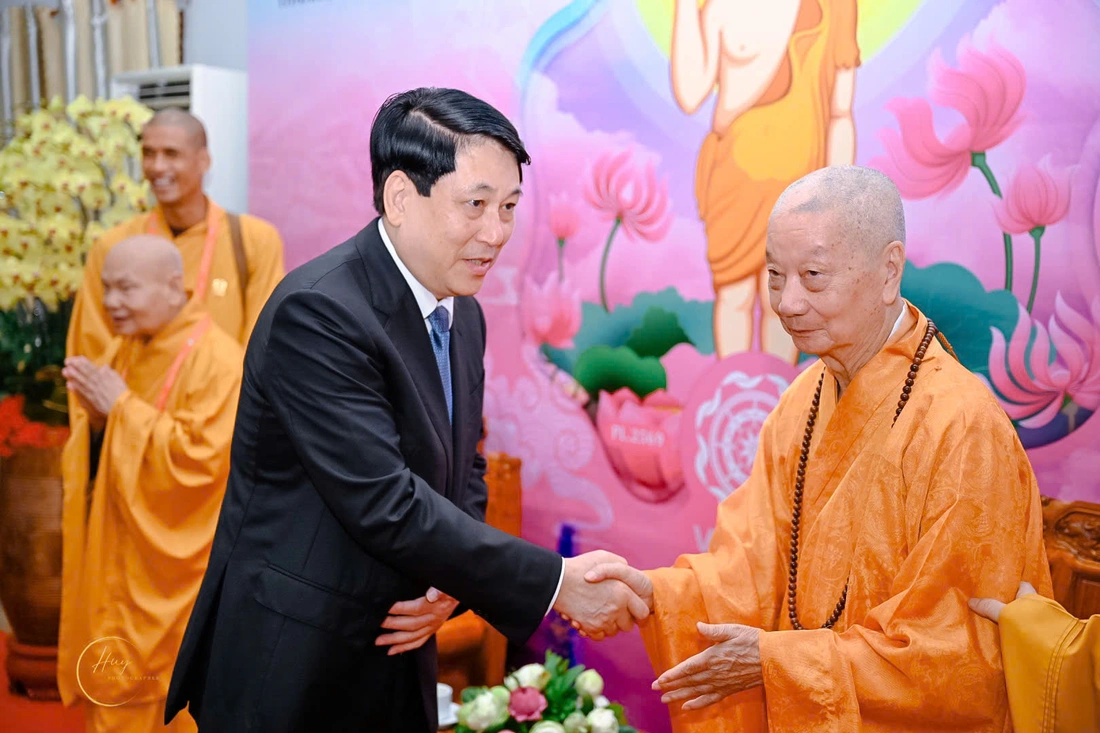
President Luong Cuong shakes hands with Supreme Patriarch Thich Tri Quang - Photo: DANG HUY
We, the delegates attending the 2025 United Nations Day of Vesak in Ho Chi Minh City - Vietnam, representing Buddhist traditions, leaders of the Sangha, Buddhist organizations; scholars, researchers, and delegates of peace organizations from 85 countries and territories gathered at the Vietnam Buddhist Academy in Ho Chi Minh City, Vietnam from May 6 to 8 to celebrate the 20th United Nations Day of Vesak and hold a scientific conference with the theme: "Solidarity and Tolerance for Human Dignity: Buddhist Insight for World Peace and Sustainable Development".
Whereas, pursuant to resolution 54/115 of the United Nations General Assembly adopted on 15 December 1999, Vesak has been officially recognized as an international religious and cultural event, to be celebrated annually at the United Nations Headquarters and its regional offices from the year 2000 onwards.
This year's United Nations Day of Vesak held in Ho Chi Minh City, Vietnam has a very special meaning for monks, nuns, Buddhists and the Vietnamese people.
At the same time, it is also a good opportunity for the Buddhist community and international friends to celebrate with the Vietnamese people the important historical event of the country: the 50th anniversary of the country's reunification (April 30, 1975 - April 30, 2025), and the 80th anniversary of Vietnam's National Day (September 2, 1945 - September 2, 2025).
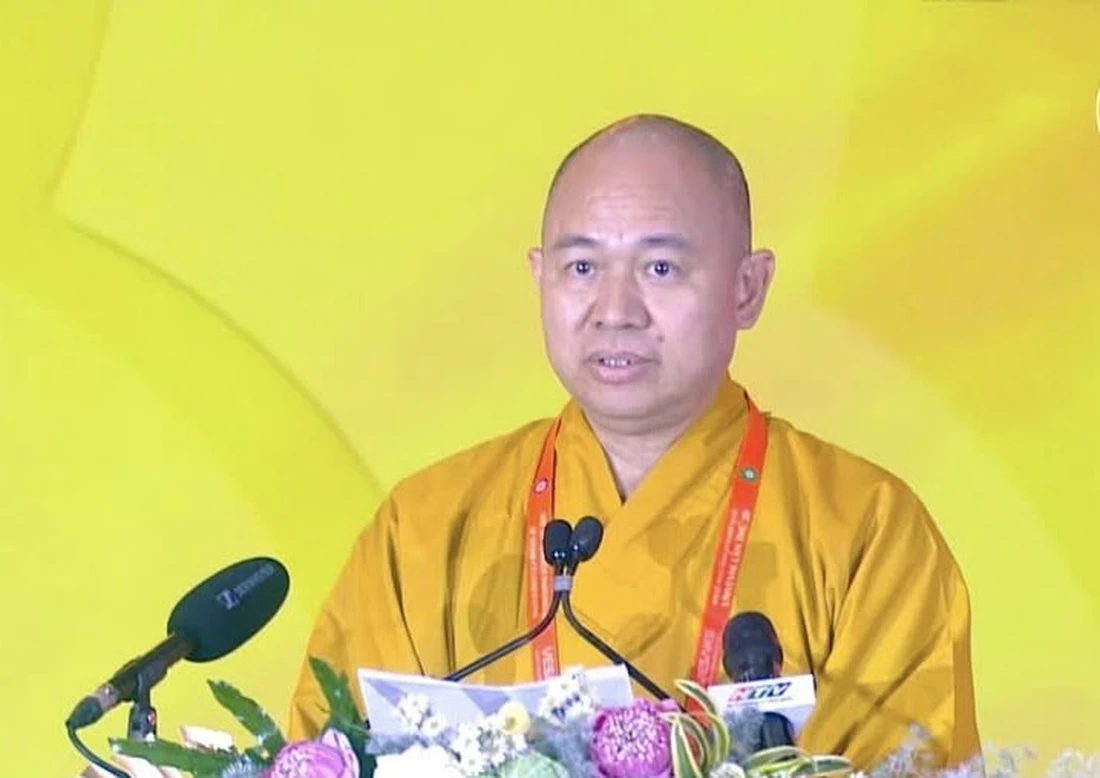
Most Venerable Thich Duc Thien read the full text of the Joint Statement of the 2025 Vesak Celebration at the closing session on the morning of May 8.
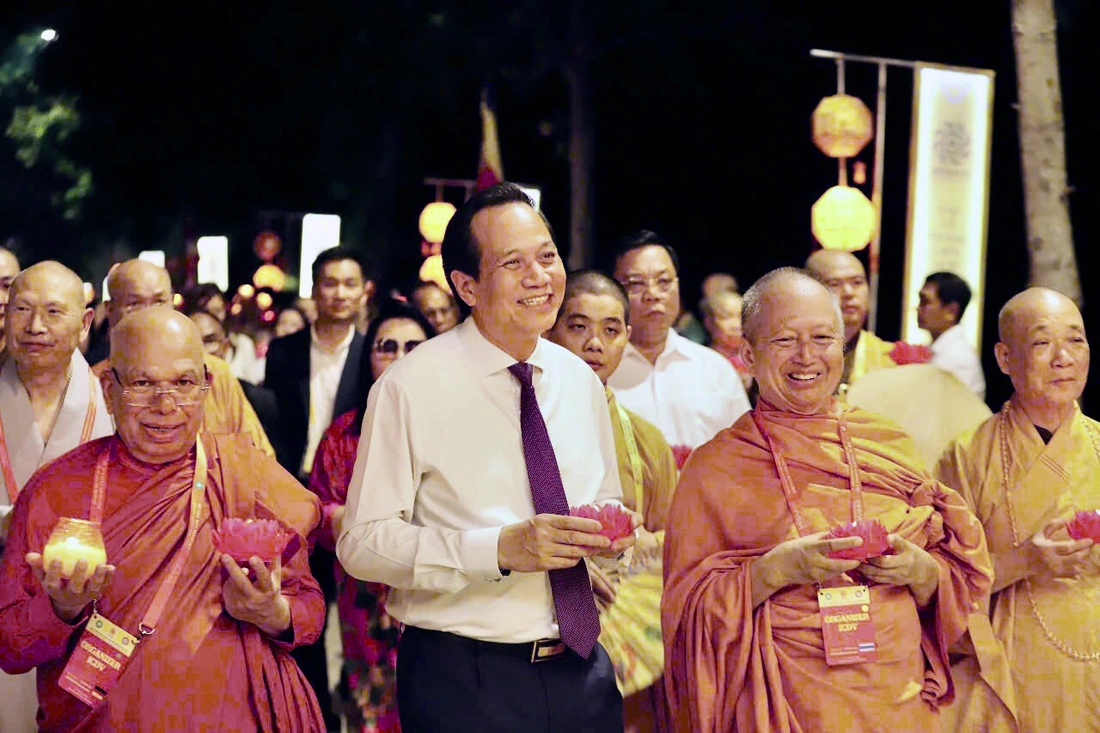
Minister of Ethnic Minorities and Religions Dao Ngoc Dung attends the flower lantern festival - Photo: HOAI PHUONG
Together we congratulate the Vietnamese people when witnessing the strong transformation of Vietnam, especially witnessing the great achievements in all aspects of life, economic development, culture, society... of Vietnam, in which Ho Chi Minh City stands out after 50 years of national reunification.
Vietnam's international position is increasingly enhanced and plays an important role in the region and the world.
The 4th United Nations Day of Vesak held in Vietnam gives us a clearer view of the rich, diverse, and free religious life in Vietnam.
We clearly see the strong commitments and practical implementation of the Vietnamese Party and State in respecting and ensuring the freedom of belief and religion of all people.
In that context, the United Nations Day of Vesak affirms the role of Buddhism in strengthening solidarity, promoting peace, tolerance and sustainable development worldwide.
Whereas this year’s Vesak reflects our shared aspiration to apply Buddhist wisdom and moral responsibility to address pressing global issues, including conflict resolution, social justice, environmental sustainability and international cooperation, in line with the United Nations Sustainable Development Goals.
The 2025 United Nations Day of Vesak in Ho Chi Minh City was a great success, bringing faith and optimism in the bright future of humanity.
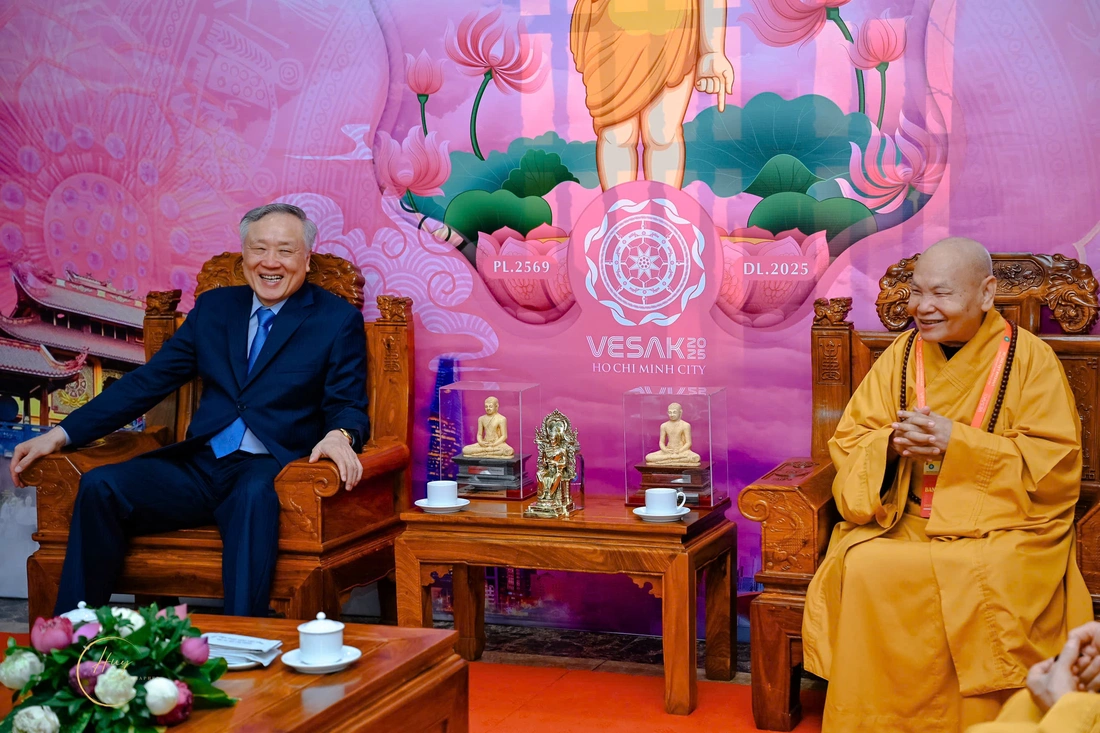
President of the Vietnam Buddhist Sangha Thich Thien Nhon receives Permanent Deputy Prime Minister Nguyen Hoa Binh - Photo: DANG HUY
We express our gratitude and appreciation to the Government of Vietnam, the Vietnam Buddhist Sangha, and especially the Ho Chi Minh City government for their hospitality, dedication, and support for the success of Vesak and their vision in organizing this historic event.
At the same time, we reaffirm Vietnam's role as one of the centers of world Buddhism, the center of engaged Buddhism associated with cultural diplomacy activities, promoting solidarity and harmony for peace and happiness for humanity.
Therefore, after discussing together in a spirit of compassion, wisdom and harmony at the conference sessions, we, the delegates, unanimously approved and promulgated the Ho Chi Minh City Declaration , presenting the Buddhist response to the world's urgent challenges, based on the principles of non-violence, tolerance and human dignity, including:
Article 1: Solidarity and tolerance for human dignity
1.1. We are committed to promoting solidarity and tolerance for human dignity; taking people as the center, respecting dignity, leaving no one behind on the journey of sustainable development.
At the same time, it strengthens Buddhist responses to global challenges, and today's pressing issues of social inequality, discrimination and political division are undermining peace and cooperation.
1.2. We call for enhanced cultural and religious dialogue as a means to bridge gaps, build trust and strengthen Buddhist engagement in international diplomatic and conflict resolution efforts to promote sustainable global harmony.
1.3. We affirm that human dignity is inextricably linked to peace, justice, non-violence and equality, and call on world leaders to respect these principles in accordance with the Universal Declaration of Human Rights and the United Nations Sustainable Development Goals (SDGs).
1.4. We advocate the integration of Buddhist ethical values into policy-making and governance, ensuring that compassion, wisdom and Buddhist ethics in leadership guide decisions at local, national and international levels.
1.5. We support the principles of engaged Buddhism as a transformative force in addressing the poverty crisis, accelerating poverty reduction; in addressing issues of gender equality and ecological sustainability, and call on Buddhist organizations to take a more proactive role in social justice initiatives.
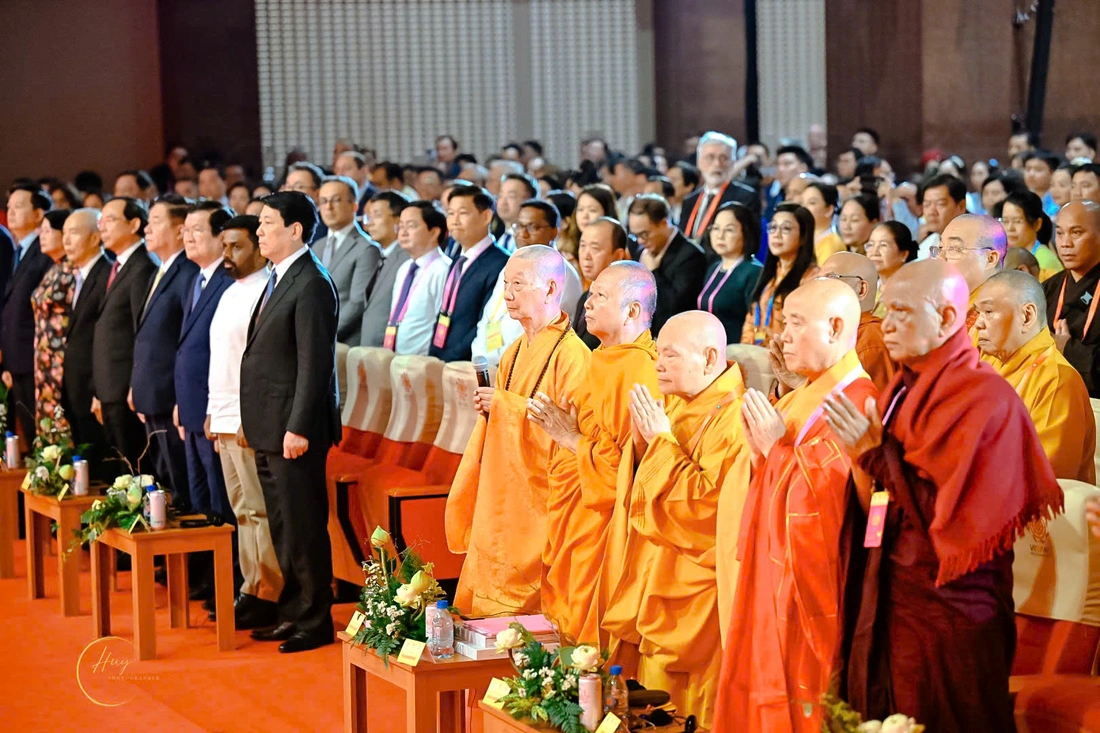
President Luong Cuong and delegates attend the opening ceremony of the 20th United Nations Vesak Celebration - Photo: DANG HUY
Article 2: Nurture inner peace for world peace
2.1. We affirm that inner peace is the fundamental prerequisite for achieving world peace, which requires a universal commitment to mindfulness, morality ( sīla ) and wisdom ( paññā ) to build lasting harmony within individuals and society as a whole.
2.2. We advocate integrating Buddhist mindfulness practices into post-conflict reconciliation, diplomacy, and reconstruction programs to promote emotional resilience, nonviolent communication, and collective healing.
2.3. We call on governments and global organizations to adopt mindfulness and ethical leadership training based on Buddhist principles, to foster deeper emotional management, wiser ethics, and more compassionate governance skills.
2.4. We support the establishment of Buddhist Peace Centers that train community leaders in Buddhist governance, ethics, and methods of conflict resolution based on Buddhist philosophy.
2.5. We call for the integration of the Buddhist principles of non-attachment ( upādāna ) and equanimity ( upekkhā ) into policies and governance structures, ensuring that decisions are truly wise, balanced and long-term.
Article 3: Forgiveness, Healing with Mindfulness and Reconciliation
3.1. We affirm that mindful forgiveness and healing are fundamental to achieving sustainable post-conflict justice, ensuring that reconciliation efforts promote deep intergenerational healing, collective recovery and lasting peace.
3.2. We call for the application of Buddhist principles of compassion, equanimity and right speech to be integrated into conflict resolution, to promote dialogue, understanding and ethical diplomacy.
3.3. We advocate for the implementation of healing initiatives based on Buddhist psychotherapy, incorporating meditation practices and mindfulness-based interventions to support post-conflict communities in overcoming trauma, loss and social disintegration.
3.4. We call for the establishment of reconciliation commissions guided by Buddhist ethical principles, to ensure that the process of justice prioritizes deep social harmony, inclusive participation and moral responsibility in divided societies.
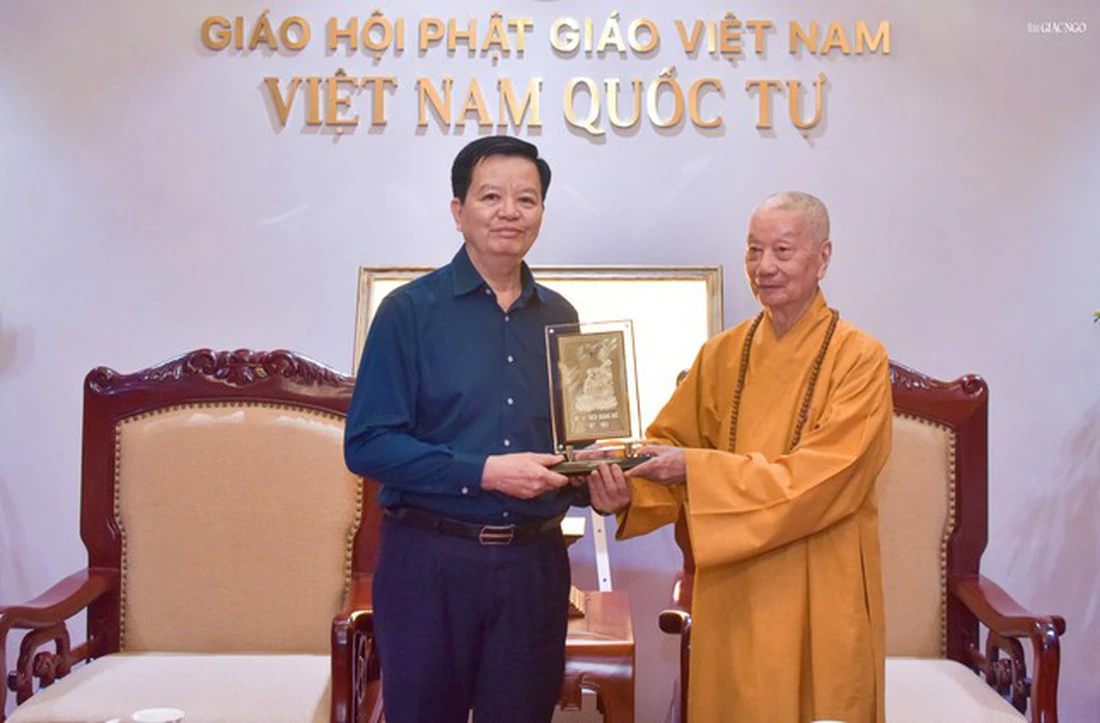
The Supreme Patriarch presented a bronze photo depicting Bodhisattva Thich Quang Duc immolating himself and the symbol of Vesak 2025 in Ho Chi Minh City - Photo: GIAC NGO ONLINE
Article 4: Buddhist Compassion in Action: Shared Responsibility for Human Development
4.1. We emphasize the urgent need to build a just economy, based on practical needs, built on the Buddhist principles of contentment, ethical distribution of wealth and moral responsibility in placing human dignity above mere profit.
4.2. We call on governments to implement green economy, digital economy, circular economy, and sustainable development models based on Buddhist ecological ethics, ensuring that regenerative economic policies are consistent with ecological balance, intergenerational equity, and long-term social stability.
4.3. We promote Buddhist-led social entrepreneurship, promoting ethical labour practices, fair trade models and compassionate economies, to advance the rights of vulnerable communities and enhance human security.
4.4. We call on policy makers to integrate the Buddhist teachings of contentment ( santuṭṭhi ), generosity ( dāna ) and right livelihood ( sammā ājīva ) into economic justice policies, wealth distribution mechanisms and sustainable business regulations.
4.5. We call for increased investment in Buddhist humanitarian initiatives to address pressing crises such as poverty, famine, forced displacement and socio-economic inequality through volunteer work.
Article 5: Mindfulness in education for a compassionate and sustainable future
5.1. We call for the integration of Buddhist ethics and mindfulness education into global curricula, teacher training programs, and lifelong learning models to foster wisdom, ethical leadership, and social responsibility.
5.2. We urge educational institutions to adopt a compassion-based learning model that emphasizes ethical reasoning, nonviolent communication, and contemplative teaching methods as essential tools for building more harmonious and ethical societies.
5.3. We call for the adoption of mindfulness-based interventions in education systems, to address youth mental health crises, ethical dilemmas and increasing pressures from modern society and technology.
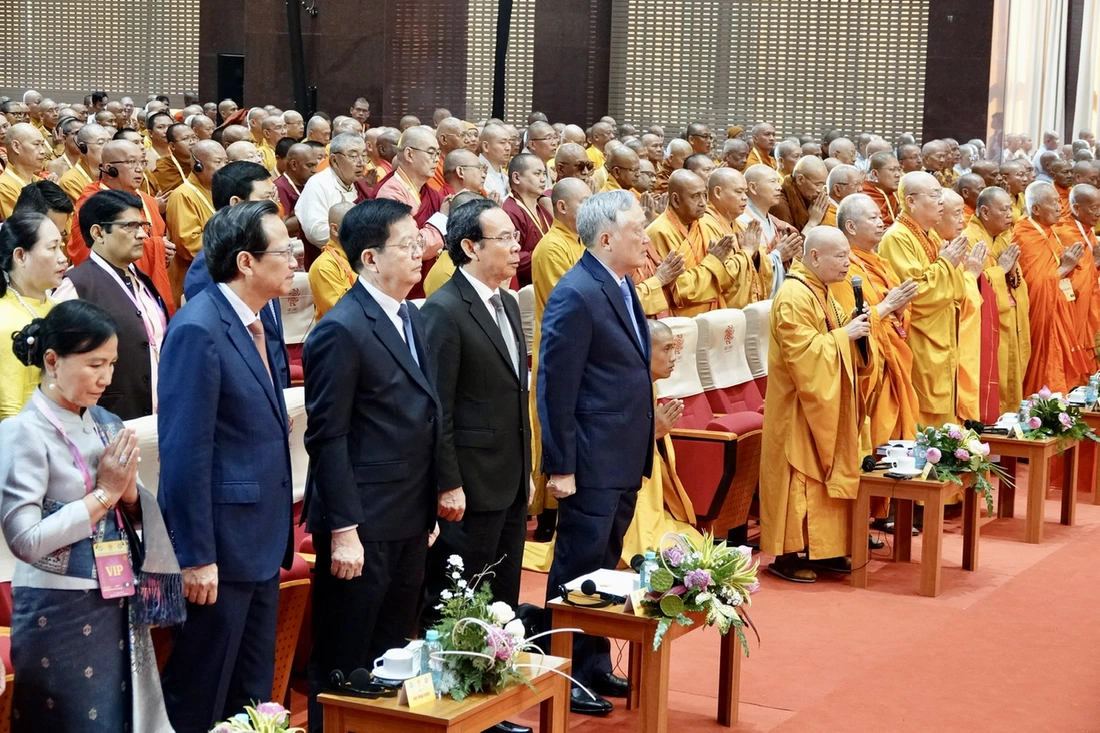
Delegates chant Buddha's name to pray for world peace - Photo: TTD
Article 6: Promote solidarity and cooperative efforts for global harmony
6.1. We call on Buddhist leaders to play an active role in United Nations peace missions and inter-religious forums, contributing wisdom-based solutions to conflict prevention, peace building and reconciliation.
6.2. We affirm that Buddhist values of non-violence ( ahiṃsā ) and collective responsibility should shape climate policy and disaster response strategies, ensuring that ecosystem conservation remains a fundamental pillar of global governance.
6.3. We support a commitment to humanitarian relief, post-conflict reconstruction and environmental protection, aiming to mobilize global Buddhist resources to respond to social crises and challenges.
6.4. We pay our utmost respect to the relics of Buddha Shakyamuni, the national treasure of India, and the heart relics of Bodhisattva Thich Quang Duc of Vietnam as sacred heritages of humanity for world peace, to be enshrined within the framework of the 2025 United Nations Vesak Celebration in Ho Chi Minh City.
Article 7: Host country of the 2026 United Nations Vesak Festival
Finally, the International Organizing Committee of the United Nations Day of Vesak is pleased to announce its approval and support for the Buddhist Association of China to host the 21st United Nations Day of Vesak in the People's Republic of China in 2026.
We respectfully invite Buddhist leaders, scholars, and peace-loving people to attend this momentous event in the People's Republic of China.
Conclude
In the spirit of the United Nations Day of Vesak 2025, we, the delegates hereby, reaffirm our unwavering commitment to apply Buddhist wisdom, moral responsibility and collective action to bring about world peace, protect human dignity and sustain the well-being of this planet.
We call for:
- All nations prioritize policies of peace, sustainable environmental development and economic justice, instead of military competition and over-exploitation of natural resources.
- Global organizations apply Buddhist ethical principles in governance, diplomacy and sustainable development.
- International organizations recognize Buddhist wisdom as an essential resource in conflict resolution and global ethics.
- The international Buddhist community engages in collaborative efforts to shape ethical leadership, economic justice, and environmental healing.
Let the Ho Chi Minh City Declaration be a moral compass, a strategic framework and an urgent call to action towards a more just, peaceful and sustainable world.
May all beings be free from suffering. May wisdom and compassion enlighten our actions. May the 2025 United Nations Day of Vesak mark a new era of global unity.
Source: https://tuoitre.vn/be-mac-dai-le-vesak-2025-ra-tuyen-bo-tp-hcm-20250508111825763.htm




![[Photo] Party and State leaders attend the special art program "You are Ho Chi Minh"](https://vphoto.vietnam.vn/thumb/1200x675/vietnam/resource/IMAGE/2025/5/18/6895913f94fd4c51aa4564ab14c3f250)
![[Photo] Many young people patiently lined up under the hot sun to receive a special supplement from Nhan Dan Newspaper.](https://vphoto.vietnam.vn/thumb/1200x675/vietnam/resource/IMAGE/2025/5/18/6f19d322f9364f0ebb6fbfe9377842d3)
![[Photo] Ready for the top competitions of Vietnamese table tennis](https://vphoto.vietnam.vn/thumb/1200x675/vietnam/resource/IMAGE/2025/5/18/9c547c497c5a4ade8f98c8e7d44f5a41)

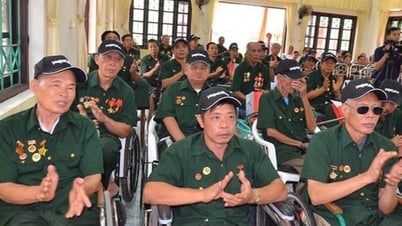

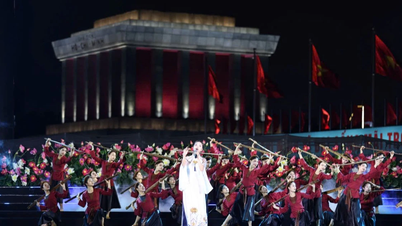

![[Photo] Walking on the royal poinciana flower road in the West](https://vphoto.vietnam.vn/thumb/402x226/vietnam/resource/IMAGE/2025/5/18/f9335355d0744d1593f7e36bc4c7f4b7)

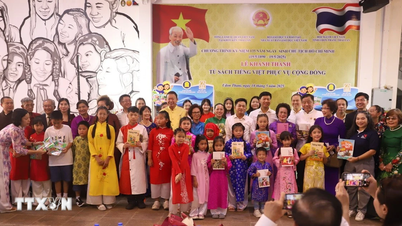

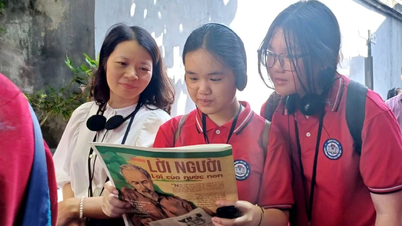







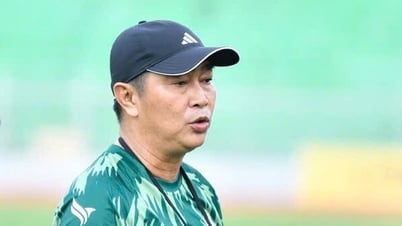

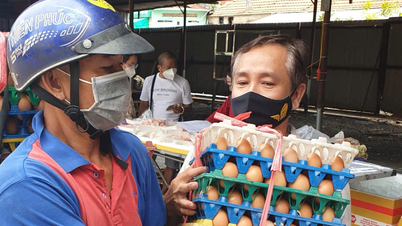















































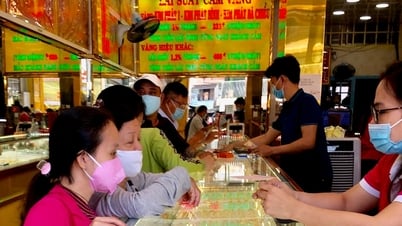





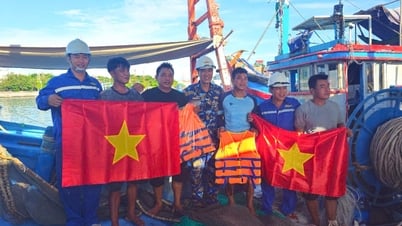

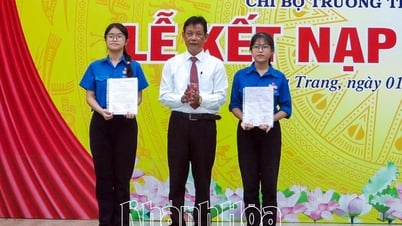










Comment (0)